Understanding the Costs and Coverages for Autism Assessments
Seeking an autism evaluation is a crucial step towards understanding and supporting individuals with autism spectrum disorder (ASD). However, concerns about the costs involved can be a significant hurdle for many families. This article explores the typical expenses associated with autism evaluations, the factors influencing these costs, insurance coverage options, and available financial assistance resources. By understanding these elements, families can better navigate the financial landscape of autism assessment and access the support they need.
Range and Types of Autism Evaluation Costs
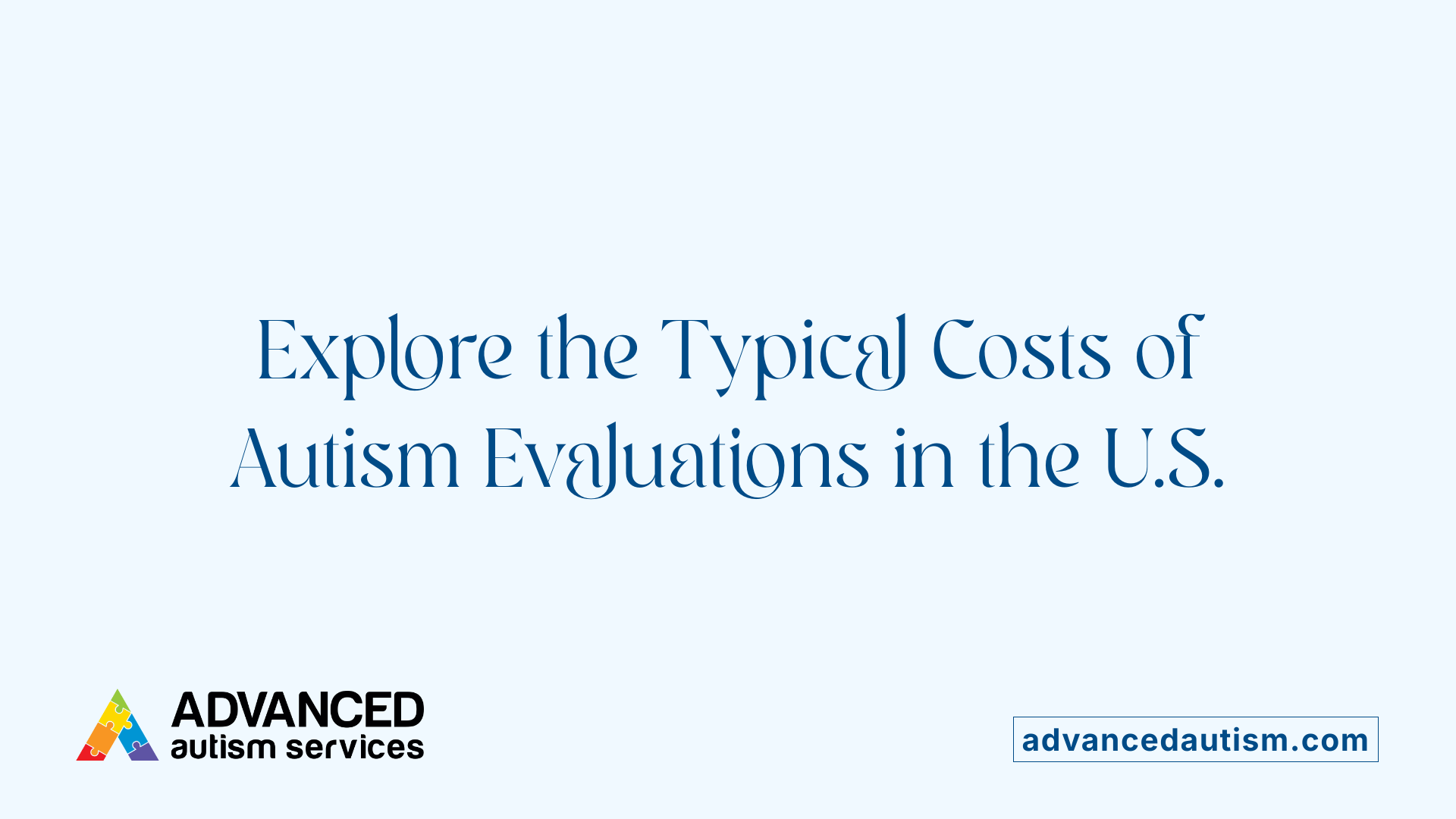
What are the typical costs associated with autism evaluations?
Autism evaluation expenses in the United States vary broadly depending on location, provider qualifications, and the scope of the assessment. On average, the cost ranges from about $1,000 to $3,800, but in some cases, prices can go higher based on specific circumstances.
For comprehensive assessments, expenses often fall between $2,500 and $5,000. These evaluations usually involve detailed testing, observation, and multiple sessions to provide a thorough diagnosis. Professional expertise also impacts the price; psychologists and neuropsychologists tend to charge between $1,200 and $9,000, with neuropsychologists typically on the higher end.
Insurance coverage can help offset these costs significantly. Many plans, especially in certain states, cover parts of the assessment, reducing out-of-pocket payments. Additionally, low-cost options are available through university programs, community clinics, and early intervention services, which can be beneficial for families with limited financial resources.
How do screening, developmental, and comprehensive evaluations differ in cost?
The cost of autism assessments depends largely on their depth and purpose.
- Screening: Basic screening tools like the M-CHAT-R are usually included in routine pediatric visits, costing nothing beyond standard copays, roughly $15–$25.
- Developmental evaluations: These typically cost between $1,500 and $4,000 and involve detailed observation and interviews focused on developmental milestones.
- Comprehensive evaluations: These are extensive assessments involving multiple testing tools, like the ADOS and ADI-R, often costing from $2,500 up to $5,000 or more. They provide an in-depth analysis suitable for complex cases or diagnosis in older individuals.
What is the cost difference between adult and childhood assessments?
Childhood autism evaluations tend to be somewhat less costly on average, usually between $1,200 and $3,000, reflecting the scope and nature of pediatric assessments. Adult evaluations can range higher, from around $2,000 to $5,000, as they often require more specialized testing and are less frequently covered by insurance.
The evaluation process for adults generally focuses on identifying traits linked to Autism Spectrum Disorder and does not always include comprehensive neuropsychological testing, which can add to costs. It may involve structured interviews, observational assessments like the ADOS, and social-emotional functioning evaluations.
| Evaluation Type | Typical Cost Range | Notes |
|---|---|---|
| Screening (e.g., M-CHAT-R) | $0–$25 (mostly free) | Usually part of routine pediatric check-ups |
| Developmental Evaluation | $1,500–$4,000 | Focuses on developmental progress in children |
| Comprehensive Evaluation | $2,500–$5,000+ | Extensive testing including ADOS, ADI-R |
| Adult Evaluation | $2,000–$6,000 | Focused on adult traits; may not include neuropsych testing |
Understanding the varied costs and options available can help families plan accordingly and seek the most appropriate services within their financial means.
Factors That Influence Evaluation Costs
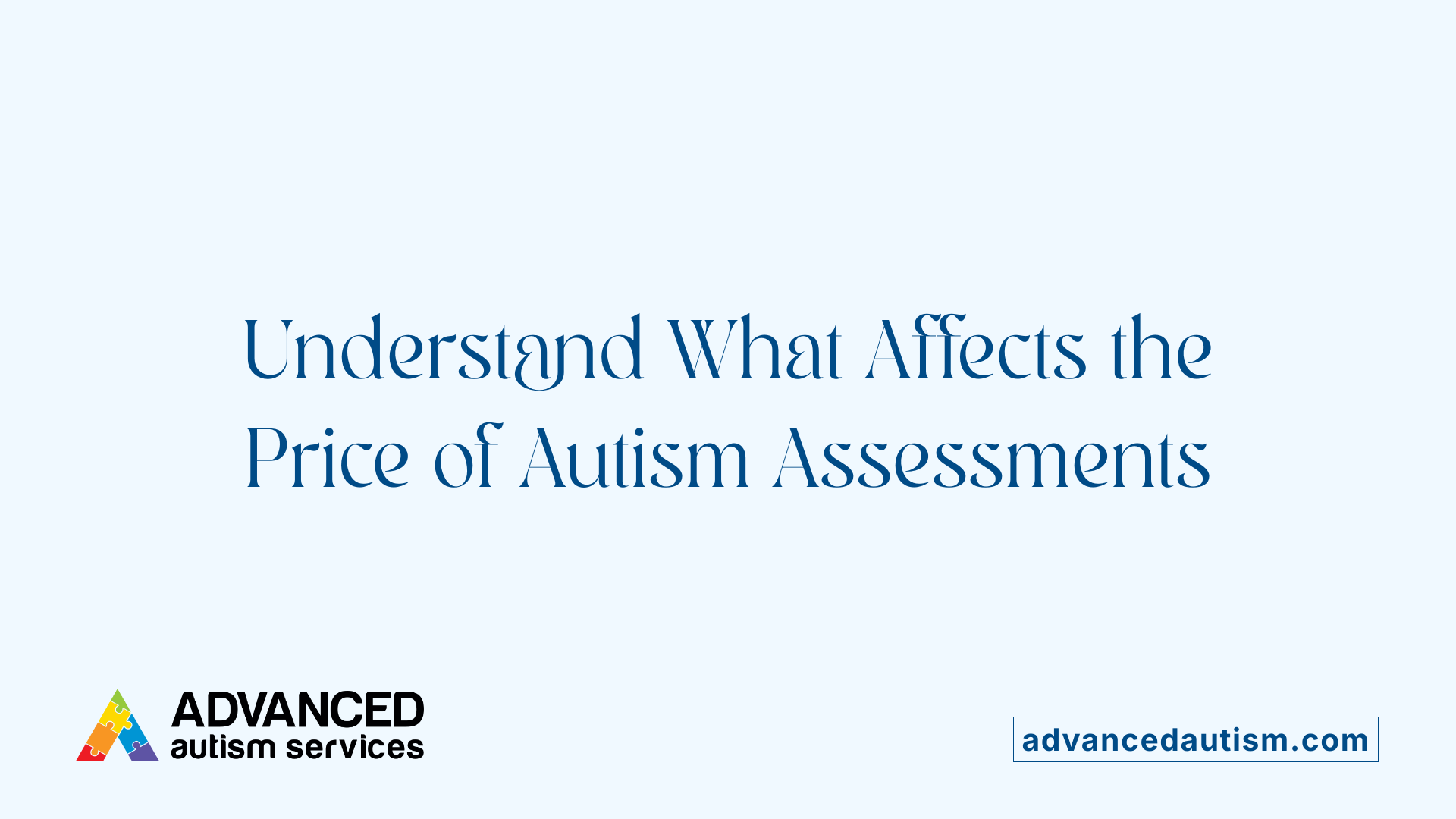
What factors influence the cost of autism assessments?
The price of autism evaluations can vary widely depending on several important factors.
First, the type and scope of the assessment play a large role. Basic developmental screenings are generally less costly, often around $1,000, whereas comprehensive evaluations that include multiple tests and observations can range from $2,500 to $5,000 or more. These detailed assessments typically cover cognitive testing, social-emotional assessments, and observations, which increase the overall expense.
Second, the qualifications and expertise of the professionals conducting the evaluation impact the cost. Psychologists, developmental pediatricians, psychiatrists, and neuropsychologists each have different fee structures. Neuropsychologists, who often conduct in-depth neuropsychological testing, may charge between $3,000 and $9,000, reflecting their specialized skill set.
Third, the tools and materials used during assessments influence costs. Certain standardized tests like the Autism Diagnostic Observation Schedule (ADOS) or the Autism Diagnostic Interview-Revised (ADI-R) involve licensing fees and specialized materials, which add to the total charge.
Fourth, geographic location also affects pricing. Urban centers like Los Angeles and San Francisco tend to have higher costs—sometimes reaching $7,000 to $10,000—due to higher living costs and demand. Conversely, rural or less-populated areas may offer lower rates, but access might be limited.
Finally, the difficulty and duration of the evaluation process are factors. Longer and more complex assessments require more time and resources, raising the overall cost. When additional services such as record reviews, follow-up consultations, or report writing are involved, these are billed separately at hourly rates.
Insurance coverage can help mitigate out-of-pocket expenses but varies by plan and provider. Understanding these factors helps families navigate the costs and find the most suitable evaluation options for their needs.
| Factor | Description | Typical Cost Range | Additional Notes |
|---|---|---|---|
| Provider Credentials | Experience and specialization of the clinician | $1,800–$9,000 | Neuropsychologists cost more due to specialization |
| Evaluation Scope | From screening to comprehensive set of tests | $1,000–$5,000 | More extensive assessments cost more |
| Assessment Tools | Use of standardized tests like ADOS or ADI-R | Included in overall cost | Licensing fees increase expenses |
| Geographic Location | Urban vs. rural costs | $1,000–$10,000 | Urban areas tend to be more expensive |
| Duration and Complexity | Length and depth of testing | Varies | More complex evaluations cost more |
Searching for "factors affecting autism evaluation costs" can provide additional insights into how these variables directly impact price.
Insurance Coverage and How It Affects Expenses
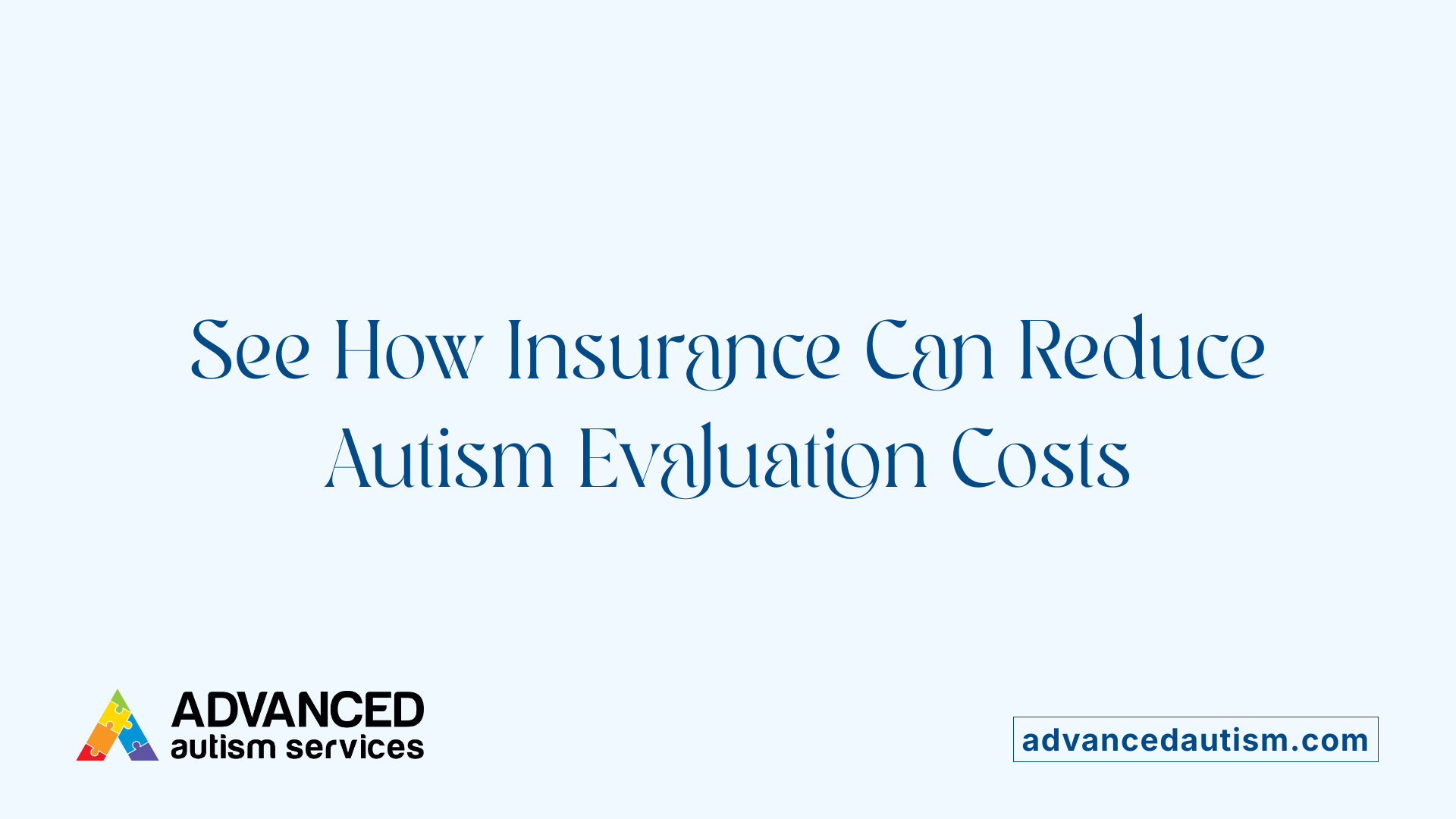
How does insurance coverage impact the cost of autism assessments for children and adults?
Insurance coverage can significantly lessen the financial obligations associated with autism evaluations for both children and adults. Many health plans now include benefits for autism diagnosis, which can cover various assessment components.
For children, states often have mandates requiring insurers to provide coverage for autism-related services. This includes diagnostic testing, behavioral therapies such as Applied Behavior Analysis (ABA), and other therapeutic interventions. The extent of coverage, however, varies depending on the specific state laws and individual insurance policies.
Adult assessments, especially targeted screening or diagnostic evaluations, also benefit from insurance coverage, often reducing out-of-pocket costs. In cases where coverage is active, expenses such as co-pays, coinsurance, and deductibles are either minimized or eliminated.
Most comprehensive plans—especially fully insured private insurance and Medicaid programs—offer broad coverage for autism testing. Conversely, self-funded insurance plans may have more variability, and some may limit coverage or require preauthorization.
Preauthorization is an important step where insurance companies approve the assessment process beforehand. Limitations such as benefit caps or maximum coverage amounts can influence the family’s costs, making it essential to verify plan details.
To navigate these complexities, resources like Autism Speaks and state health departments provide guidance on coverage specifics. These organizations assist families in clarifying policy benefits, submitting claims, and advocating for the services their loved ones need.
Ultimately, understanding insurance plans, verifying benefits, and knowing how to appeal denials can substantially reduce the out-of-pocket expenses. This support enables families to access necessary evaluations without facing prohibitive costs.
Financial Assistance and Low-Cost Options
Are there financial assistance options for autism evaluations? Yes, there are several programs and resources designed to help families manage the costs of autism assessments.
Government programs such as Medicaid, the Children's Health Insurance Program (CHIP), Supplemental Security Income (SSI), and Temporary Assistance for Needy Families (TANF) can provide financial support for qualifying families. These programs often cover part or all of the expenses related to diagnosis, healthcare, and therapy services, especially for lower-income households.
Community clinics, university programs, and research initiatives offer more affordable evaluation options. Many universities with autism research and treatment centers provide sliding scale fees or free assessments for eligible individuals. For example, clinics at institutions like UCLA and the University of Washington may have reduced costs or payment plans.
Nonprofit organizations and charities also play a vital role. Groups such as Autism Speaks, the Maggie Welby Foundation, and the National Autism Association offer grants, subsidies, and resources to help offset the costs of evaluations, treatment tools, and related services.
Additionally, some local and state programs provide funding or assistance for autism diagnosis. Early childhood programs, school-based evaluations, and community health centers may offer free or low-cost assessments, especially for children.
Families are encouraged to contact local agencies, healthcare providers, and autism support organizations to explore available options. Each family’s eligibility and available support may vary based on geographic location, income level, and specific needs.
Overall, while autism evaluation costs can be high, numerous financial aid pathways exist to reduce the burden and ensure timely diagnosis and intervention for those in need.
Why Autism Assessments Can Be Costly
Why are autism assessments often expensive?
Autism evaluations tend to be on the higher end of healthcare costs because they involve a complicated, multi-step process. These assessments are not quick diagnostics; instead, they include several components such as clinical interviews, cognitive and behavioral testing, and the use of specialized assessment tools like the Autism Diagnostic Observation Schedule (ADOS) or the Autism Diagnostic Interview-Revised (ADI-R). Each step requires extensive analysis and interpretation by highly trained professionals, including psychologists, psychiatrists, or developmental pediatricians.
The professionals performing these evaluations must have advanced education and training. They typically hold undergraduate and postgraduate degrees, and many have additional certifications or specialties in autism diagnosis. Their expertise ensures accurate assessments but also adds to the overall cost, as their services are in high demand and require ongoing professional development.
Further expenses come from the use of sophisticated assessment materials and tools. These materials, essential for reliable diagnosis, are often expensive and require regular updates. Providers may also attend workshops to stay current on best practices, which adds to the costs.
Geographic and demographic factors significantly influence the price of assessments. Urban areas like Los Angeles and San Francisco generally charge more due to higher living costs and greater demand for specialized services. Moreover, the complexity of each case, such as the age of the individual being assessed and the need for additional testing or follow-up, can increase the total cost.
Insurance coverage varies widely and can influence how much families pay out of pocket. Many insurance plans now include some coverage for autism assessments, especially for children, but out-of-pocket expenses for comprehensive, multi-disciplinary evaluations can still be substantial.
In summary, the high costs associated with autism assessments reflect the detailed, specialized, and resource-intensive nature of the diagnosis process. Families often face these costs when seeking accurate evaluations that are critical for accessing appropriate educational, medical, and support services.
Understanding the Duration and Process of Evaluation
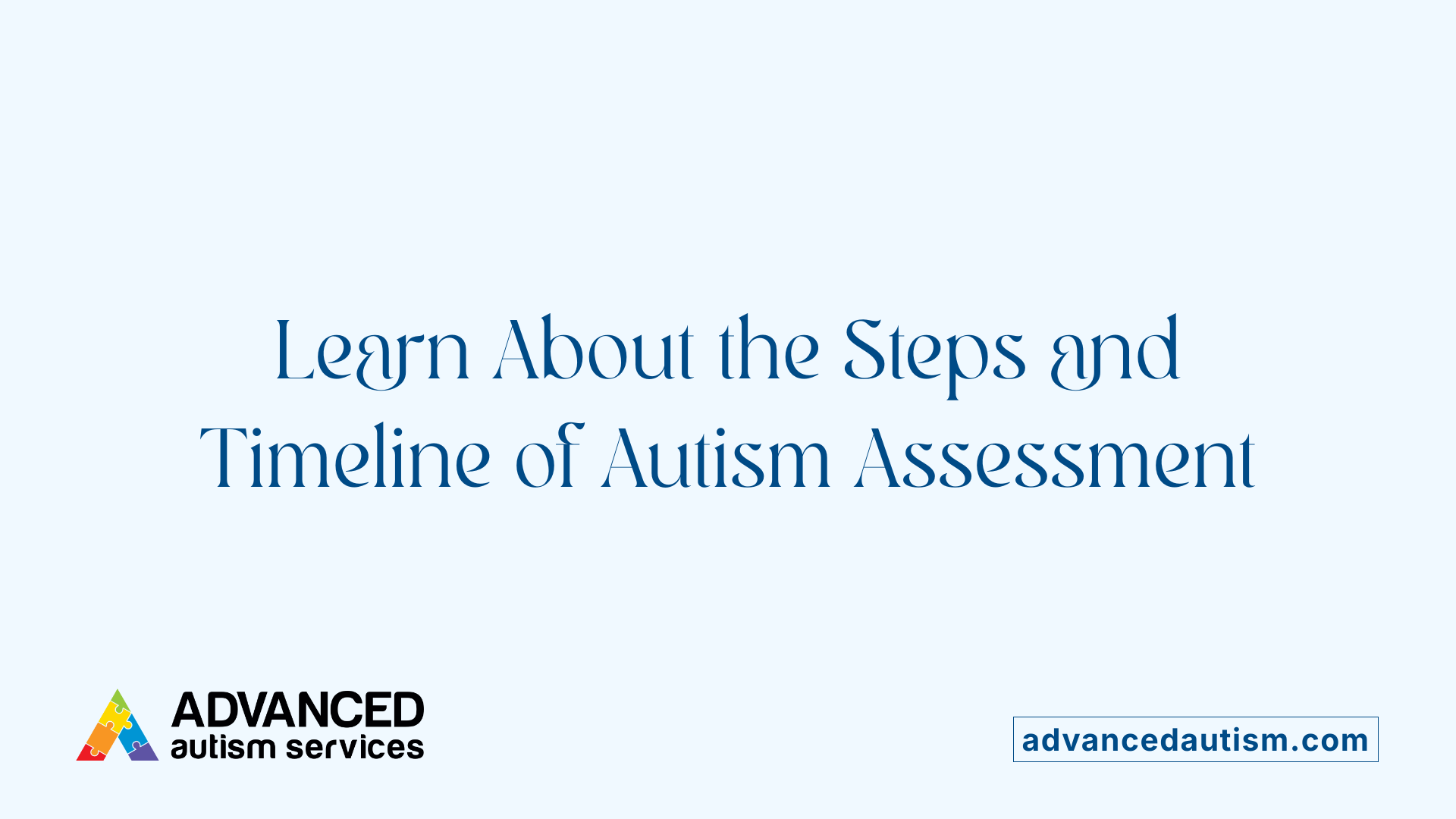
Typical steps involved in diagnosis for children and adults
The process of diagnosing autism involves several detailed steps. For children, it often begins with a screening such as the M-CHAT-R, which can be included in regular pediatric visits at no extra cost. If screening indicates potential autism traits, a comprehensive assessment follows, involving a review of developmental history, clinical observations, and standardized tests like the Autism Diagnostic Observation Schedule (ADOS) and the Autism Diagnostic Interview-Revised (ADI-R). This process usually includes multiple visits and assessments over several hours.
For adults, the diagnostic process is shorter and more targeted. It typically involves a clinical interview, cognitive testing, and social-emotional evaluations, which collectively aim to identify autism traits without extensive neuropsychological testing. The process excludes some tests used for children, focusing instead on observations and questionnaires.
Time frame for conducting assessments
The evaluation duration varies depending on scope and individual complexity. Child assessments might take several sessions over a few weeks, especially if comprehensive testing is involved. Adult evaluations generally are completed within one or two visits, often lasting a few hours each.
Follow-up and report writing procedures
After assessments, professionals compile their findings into detailed reports. This phase can take from a few days up to several weeks, depending on the evaluation topics and additional services required. Families are then notified of the results and given guidance on next steps, which may include treatment planning or further evaluations.
Variability based on individual needs
The assessment process isn’t uniform for everyone. Factors such as age, severity of symptoms, and additional needs can influence the length and complexity of the evaluation. Some individuals require a series of in-depth assessments, while others may need only a brief screening.
Financial considerations
When seeking an autism diagnosis, families can expect to pay approximately $1,000 to several thousand dollars for assessments. Costs depend heavily on geographic location, professional expertise, and the scope of testing. Urban areas like Los Angeles and San Francisco tend to have higher fees, ranging from $3,000 to $10,000. Insurance coverage can help reduce out-of-pocket expenses, but coverage varies by plan and state.
Additional costs and support
In cases where more extensive testing or follow-up services are needed, additional fees may apply. Many providers offer package deals or sliding scale fees to make evaluations more accessible. Families are advised to verify costs upfront, as services such as report writing, review of records, and communication may incur hourly charges.
For a comprehensive understanding of costs and process options, interested parties are encouraged to search for terms like "cost of autism diagnosis process." Awareness of these factors can help in planning for timely and effective assessments.
Additional Services and Long-Term Financial Planning
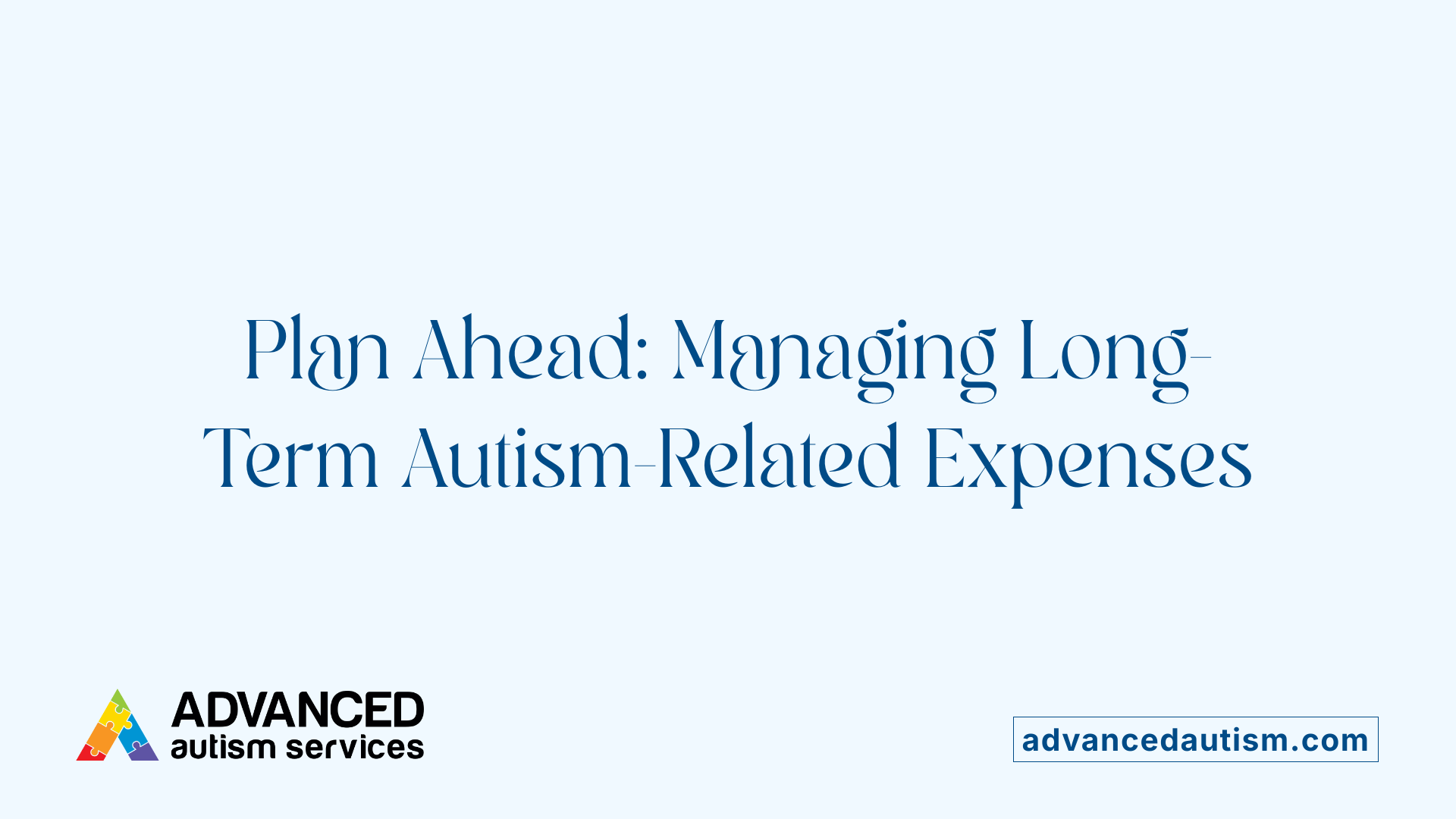 When seeking an autism diagnosis, families should be prepared for a range of costs that extend beyond the initial assessment. The price for diagnostic evaluations typically spans from $1,000 to $5,000, with higher amounts often associated with more comprehensive assessments, specialized professionals, or evaluations conducted in urban areas like Los Angeles or San Francisco.
When seeking an autism diagnosis, families should be prepared for a range of costs that extend beyond the initial assessment. The price for diagnostic evaluations typically spans from $1,000 to $5,000, with higher amounts often associated with more comprehensive assessments, specialized professionals, or evaluations conducted in urban areas like Los Angeles or San Francisco.
Follow-up services such as therapies, educational programs, and ongoing support are essential components of managing autism. These services can include behavioral interventions, speech therapy, occupational therapy, and social skills groups, with costs varying widely based on the type and intensity of each intervention.
The long-term economic impact on families can be substantial. Research indicates that the median yearly financial burden on families is around AUD $34,900, primarily due to income loss from caregiving responsibilities. Additional expenses, like therapy sessions, special education, and support programs, can add about AUD $1,400 annually for each additional ASD symptom.
Insurance coverage can help offset some of these costs, with many insurance plans now offering partial coverage for assessments and therapies. Public benefits such as Medicaid and Supplemental Security Income (SSI) often provide crucial support for ongoing needs.
To prepare financially, families may consider tools like ABLE accounts, which help save for disability-related costs without jeopardizing benefits, or establish Special Needs Trusts to manage assets for the future. Legal arrangements and planning can ensure that resources are efficiently used to support the individual’s quality of life.
In summary, navigating the financial landscape post-diagnosis involves understanding the immediate costs of assessment, planning for ongoing therapies, and using available resources effectively. Early diagnosis and intervention not only benefit the individual’s development but can also help mitigate some of the long-term financial burdens associated with autism.
Navigating Costs and Securing Support for Autism Evaluation
Understanding the costs associated with autism evaluations and the available financial resources is essential for families seeking diagnosis and support. While expenses can range widely—affected by location, provider, and evaluation type—insurance coverage and assistance programs can significantly mitigate out-of-pocket costs. Early planning and the use of community, government, and nonprofit resources can make a meaningful difference in access to necessary assessments and subsequent therapies. Being informed about the factors influencing costs and available options empowers families to navigate the process more effectively, ensuring that financial barriers do not prevent individuals from receiving the diagnosis and support they need to thrive.
References
- How Much Does an Autism Diagnosis Cost in California?
- How Much Does an Autism Evaluation Cost? See 3 Examples
- Self-Pay Adult Autism Program - Neuroaffirming Mental Health Care
- [PDF] fee schedule - uw autism center services
- What to expect when getting an adult ASD diagnosis | Autism Speaks
- How Much Does Autism Testing Cost? - KMN Psych in San Diego
- How Much Does an Autism Diagnosis Cost in Texas? - AT4K
- Autism Screening Cost without Insurance | Mira Health
- Understanding the Cost of Autism Evaluation: Key Factors and Support



